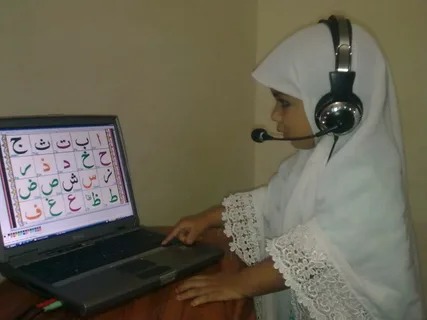In our rapidly globalizing world, learning foreign languages has become a valuable asset, opening up new opportunities both professionally and personally. Arabic, being one of the most widely spoken languages in the world, has garnered immense interest among language enthusiasts. While traditional classroom settings have been the norm for language learning, the advent of technology has introduced a revolutionary method, in this Article on Arabian Tongue we will Explorer Online Arabic Classes.
Reasons for The Growing Popularity of Online Arabic Classes

Many people of different languages have used to learn Arabic online because of:
Accessibility and Convenience
Arabic grammar course online for beginners offer the flexibility of learning from anywhere, at any time. Students no longer need to commute to physical classrooms, making it a convenient choice for individuals with busy schedules or limited access to educational institutions.
Diverse Learning Options
Online platforms provide a plethora of Arabic courses to suit different learning preferences and goals. Whether you are a beginner or seeking advanced proficiency, there are courses designed to cater to various levels and interests.
Tailored Learning Experience
In contrast to traditional classrooms, online Arabic classes often incorporate personalized learning paths, allowing students to focus on specific areas of the language where they need improvement. This individualized approach enhances the learning experience.
Benefits of Learning Arabic Online
The benefits of learning Arabic online are the following:
Enhanced Flexibility
Online Arabic Classes for Beginners empower learners to set their own pace of learning. This flexibility enables students to balance their studies with other commitments, such as work or family responsibilities.
Cost-Effective Learning
Compared to traditional language courses, online classes can be more cost-effective, as they eliminate expenses associated with commuting and physical learning materials. Additionally, there are free or affordable resources available for those on a tight budget.
Experienced and Qualified Instructors
Reputable online Arabic platforms often hire instructors who are native speakers or experts in the language. Learners have the opportunity to be taught by experienced professionals, ensuring a high standard of education.
Interactive Learning Tools
Online Arabic classes incorporate various interactive tools, such as virtual classrooms, multimedia resources, and language apps, which make the learning process engaging and enjoyable.
Choosing the Right Online Arabic Class

Factors that help you choose the right category on the Internet to learn the language:
Accreditation and Certification
Before enrolling in an online Arabic course, it is essential to check the accreditation and certification of the platform or institution. Recognized certifications add value to the learning experience and can be beneficial for future academic or professional pursuits.
Student Reviews and Testimonials
Reading Arabic online for Adults Reading reviews and testimonials from previous students can provide insights into the quality of the course, the teaching methods, and the overall experience. Positive feedback from satisfied learners is a good indicator of a reputable platform.
Curriculum and Course Structure
A well-structured curriculum that covers all aspects of the Arabic language, including speaking, listening, reading, and writing, is crucial for comprehensive learning. Reviewing the course syllabus can help determine if the content aligns with personal goals.
Technical Requirements
To ensure a smooth learning experience, it is essential to check the technical requirements for the online Arabic class. These may include a stable internet connection, compatible devices, and software specifications.
Learning Arabic for Different Purposes
Some seek to learn Arabic for many reasons, most notably:
Academic Pursuits
Many students choose to Learn Arabic Online to fulfill academic requirements, such as language credits for degree programs or to conduct research in Middle Eastern studies.
Professional Advancement
Arabic is in high demand for various careers, including international relations, journalism, business, and government sectors. Proficiency in Arabic can open doors to exciting job opportunities globally.
Cultural Enrichment
For those fascinated by the rich Arab culture, learning the language can provide a deeper understanding of literature, art, history, and traditions.
Personal Growth and Travel
Learning Arabic can be a rewarding personal challenge, and it also enhances travel experiences to Arabic-speaking countries, allowing for meaningful interactions with locals.
Overcoming Challenges in Online Arabic Learning

There are many challenges you may face in learning Arabic, but you can overcome it through:
- Language Complexity: Arabic is known for its intricate grammar and unique script. However, with dedication and practice, learners can overcome the initial complexities.
- Time Management: Self-paced learning requires discipline and time management skills to stay on track and complete the course within the desired timeframe.
- Self-Motivation: Without the physical presence of instructors, self-motivation becomes vital to maintain enthusiasm and progress steadily.
- Cultural Awareness: Learning Arabic involves understanding cultural nuances, which can be both challenging and rewarding for learners from diverse backgrounds.
Book Now: learn Online Quran Memorization Course.
Tips for Success in Online Arabic Classes
In order to learn Arabic online, you need to stick to some important advice:
- Set Clear Goals: Define specific language learning goals to stay focused and motivated throughout the course.
- Establish a Study Routine: Creating a consistent study schedule helps in developing a habit and maintaining steady progress.
- Engage in Language Immersion: Practice Arabic outside the virtual classroom by immersing yourself in Arabic media, music, and conversations.
- Seek Support and Interaction: Participate in online forums or language exchange programs to interact with fellow learners and native speakers.
Why Should Sisters Learn Arabic?
Arabic holds a special place in the hearts of Muslims worldwide. It is the language of the Quran, the holy book of Islam, and the language in which the Prophet Muhammad (peace be upon him) conveyed the divine message. For sisters, learning Arabic can unlock a deeper level of understanding and spiritual growth, Women, whether mother, sister or girl, are trying to learn Arabic to help her in the following:
The Importance of Arabic in Islam
Arabic is not only the language of the Quran but also the language of many Islamic texts, including hadith (sayings of the Prophet) and tafsir (exegesis of the Quran). Understanding Arabic allows sisters to directly connect with the original teachings and sources of Islam.
Enhanced Understanding of Quranic Verses
While translations are valuable, they can never fully capture the nuances and eloquence of the Quran’s original Arabic. Learning Arabic enables sisters to delve into the deeper meanings of verses and gain profound insights.
Better Communication with Arabic-Speaking Communities
Arabic is spoken by millions of people around the world. By learning Arabic, sisters can communicate more effectively with fellow Muslims, form meaningful bonds, and engage in intercultural dialogues.
Challenges Faced by Sisters in Learning Arabic
Despite the advantages and benefits that the sisters receive from learning the Arabic language, they face some difficulties:
1. Limited Access to Traditional Classes
Sisters often face challenges in finding local Arabic classes that cater to their specific needs. Online learning provides a viable solution, offering access to reputable courses from the comfort of their homes.
2. Balancing Family and Learning Commitments
Many sisters juggle multiple responsibilities, such as family, work, and community engagements. Online courses provide the flexibility to learn at their own pace and schedule, making it easier to strike a balance.
3. Fear of Learning a Complex Language
Arabic has a reputation for being a difficult language to learn. However, with the right guidance and support, sisters can overcome this fear and embark on a fulfilling learning journey.
Learn Now: Quran Ijazah Course for Kids.

learning Arabic can open up a world of opportunities, we’ll explore some effective tips to help you learn Arabic fast and easily online:
Choose the Right Online Course
With the vast array of online language courses available, it’s crucial to choose one that suits your learning style and needs. Look for courses that offer interactive lessons, live sessions with instructors, and opportunities to practice speaking with native Arabic speakers.
Practice Speaking Regularly
Speaking regularly is vital for improving your Arabic fluency. Find language exchange partners or join online language communities where you can practice speaking with native speakers. Engaging in conversations will help you build confidence and reinforce what you’ve learned.
Immerse Yourself in Arabic Media
Immersing yourself in Arabic media, such as movies, TV shows, and music, exposes you to the language’s natural flow and pronunciation. Watching Arabic content with subtitles can aid in comprehension and expand your vocabulary.
Utilize Language Learning Apps
Language learning apps are excellent tools for learning Arabic on the go. Apps like Duolingo, Rosetta Stone, and Memrise offer interactive exercises, vocabulary building, and gamified learning experiences.
Focus on Arabic Script
The Arabic script might seem daunting at first, but dedicating time to practice reading and writing it is essential. Familiarize yourself with the alphabet and practice writing simple words and sentences.
Book Now: Quran Recitation online Course For Kids.
Use Flashcards for Vocabulary
Create flashcards for Arabic words and phrases you want to remember. Flashcards are a great way to reinforce your memory and improve retention.
Learn Common Phrases and Expressions
Learning common phrases and expressions used in daily conversations will enable you to communicate effectively in various situations. Focus on greetings, introductions, and polite expressions.
Be Consistent and Patient
Consistency and patience are key to language learning success. Set aside regular study sessions, even if they are short, to maintain a steady learning pace. Recognize that language learning takes time, and progress may vary depending on individual factors.
Seek Guidance from Teachers and Tutors
If you encounter challenges or need guidance, don’t hesitate to seek help from Arabic teachers or tutors. They can provide personalized support and valuable feedback to improve your language skills.
Immerse in the Culture
Understanding the cultural context of a language enhances your language learning journey. Learn about Arabic traditions, customs, and values to gain a deeper appreciation for the language.
Practice with News Articles
Reading Arabic news articles exposes you to formal language and diverse vocabulary. Many online platforms offer news articles tailored for language learners.
Keep a Language Journal
Maintain a language journal to jot down new words, expressions, and thoughts in Arabic. Writing regularly helps reinforce your learning and allows you to track your progress.
Stay Motivated
Celebrate your milestones and stay motivated throughout your language learning journey. Reward yourself for achievements, whether big or small, to maintain enthusiasm.
Join Online Language Challenges
Participate in online language challenges or competitions to test your skills and engage with other learners. Friendly competition can be a fun and effective way to boost your learning.
Understanding the Importance of Learning Arabic for Quranic Reading
Arabic is the language of reading, so Muslims must learn it to understand religious concepts more clearly:
- Learning Basic Grammar and Sentence Structure: learn quran reading basics online course Understanding Arabic grammar and sentence structure is crucial for comprehension. Focus on topics like verb conjugation, noun-adjective agreement, and sentence construction.
- Building Vocabulary with Quranic Words: Create a list of commonly used Quranic words and their meanings. Regularly review and expand your vocabulary to facilitate reading.
- Practicing with Simple Quranic Verses: Start practicing with short and straightforward Quranic verses. Gradually increase the complexity as you gain confidence.
- Embracing the Beauty of Calligraphy: Appreciate the art of Arabic calligraphy, which adds an aesthetic dimension to the Quranic verses.
- Exploring Tafseer (Exegesis) of the Quran: Study Tafseer to gain a deeper understanding of the Quran’s meanings and interpretations.
- Enhancing Memorization with Repetition: Memorize verses through regular repetition to internalize the teachings of the Quran.
- Emphasizing Tajweed (Proper Recitation): Learn Tajweed rules to recite the Quran with proper pronunciation and melody.
What are the rules of the Arabic language that should be learned for junior children?

Arabic is not just a language; it is a bridge that connects individuals to a rich cultural heritage. For junior children, learning Arabic can enhance their cultural awareness, promote empathy, and encourage an open-minded perspective.
Basic Arabic Alphabets and Pronunciation
Before diving into the language’s complexities, On Arabic Language Kids Course junior learners should start with the Arabic alphabets. Arabic script is written from right to left and comprises 28 letters. Understanding the pronunciation of each letter lays a strong foundation for further learning.
Understanding Arabic Vowels and Diacritics
Arabic vowels and diacritics play a crucial role in determining the correct pronunciation of words. Junior children should familiarize themselves with the various symbols that aid in correct vocalization.
Essential Arabic Words and Phrases for Junior Learners
Introducing young learners to commonly used Arabic words and phrases helps them construct basic sentences and engage in day-to-day conversations. Learning greetings, introductions, and polite expressions creates a positive language learning experience.
Arabic Grammar and Sentence Structure Simplified
Arabic grammar can be intricate, but breaking it down into digestible parts simplifies the learning process for junior children. Understanding word order, noun-adjective agreement, and plurals is essential for forming coherent sentences.
Introduction to Arabic Verb Conjugation
Verbs form the heart of any language. Junior learners should grasp the concept of Arabic verb conjugation to express actions and emotions accurately. Practice with simple verbs is the key to proficiency.
FAQs
What are the basic requirements for taking online Arabic classes?
Most online Arabic classes require a stable internet connection, a computer or compatible device, and enthusiasm to learn.
How long does it take to become proficient in Arabic through online courses?
The duration depends on various factors, including the learner's dedication, previous language knowledge, and the intensity of the course. Generally, achieving fluency may take several months to a few years.
Are online Arabic classes suitable for beginners?
Yes, many online platforms offer beginner-level courses designed to introduce learners to the Arabic language step by step.
Can I interact with my instructors and fellow students in online classes?
Yes, online Arabic classes often include interactive features such as live video sessions, discussion forums, and group activities to facilitate interaction.
What resources are available for practicing Arabic outside of the virtual classroom?
There are numerous resources available, such as language exchange apps, Arabic media, language learning apps, and online language communities.
Conclusion
Embrace the Journey of Learning Arabic Online
Online Arabic classes have revolutionized language learning, offering accessibility, convenience, and tailored experiences for learners worldwide. Whether you are seeking academic, professional, or personal enrichment, exploring the Arabic language through online courses can be a fulfilling and transformative experience.
